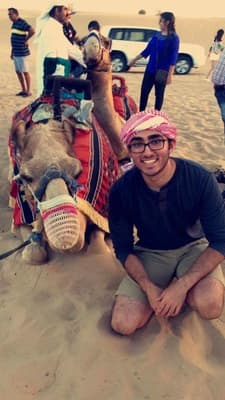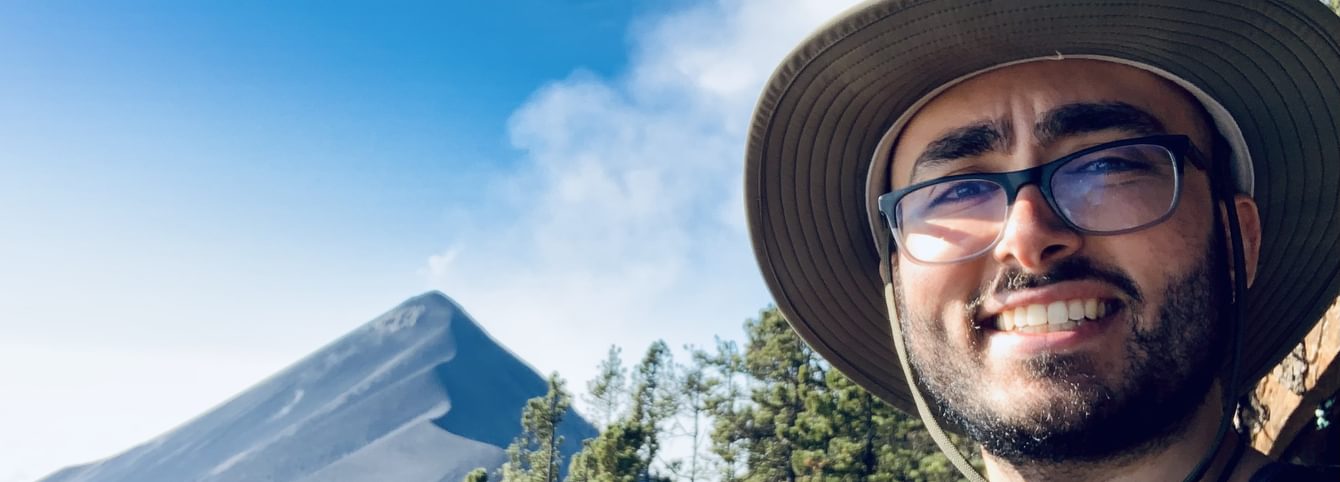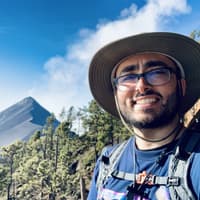Sam Ramtin
Sam Ramtin is an alumnus of the 2021 CLS Program hosted virtually by the Arab American Language Institute in Morocco (AALIM) in Morocco. Sam will be graduating this spring with an M.A. in Political Science with an emphasis in International Relations & Public Policy from San Diego State University. Sam will be putting his Arabic and Persian language skills into action this summer while serving as a CLS Coordinator for virtual institutes in Arabic and Persian.
Why Arabic?
I have always been interested in Arabic due its influence on my cultural heritage. I learned Persian growing up, appreciating the Middle East’s bustling history and vibrant people as my horizons expanded. This quickly illuminated the Arab World, pushing me to acquire its perspectives to reinforce my own. Long discussions with Arabs and Persians alike, of noble histories and hopeful futures, profoundly influenced my upbringing, inoculating me from the sectarianism that characterizes contemporary regional conflicts. This desire also ties in significantly to my professional goals of working in foreign affairs, international education, and especially on the issues plaguing relations between the United States, Iran, and the Arab World.

Unlocking Communication
I’d definitely recommend others to learn Arabic. Flashcards will become your best friend, as will any books that can simplify Arabic’s complex grammar. Fortunately, there are clear rules in the Arabic language, and once you’ve mastered those, the rest of the process easier. Any familiarity of the languages Arabic has influenced will also makes the process easier. As a Persian speaker, I was familiar with lots of vocabulary, the alphabet, and general cultural norms. Arabic will unlock communication with people from the western edges of Morocco to the Euphrates and Tigris in Iraq, and so much in between. About 350 million native speakers and 22 Arab countries! As with any language learning process, or any long-term endeavor, it is important to ‘remember your why.’ Keep those interests and passions alive, and it will ensure a deeply rewarding experience.
Intensive Immersion Virtually
CLS Arabic dramatically injected new life in my long-standing passion and interest for the language, and Middle East region more broadly. I cannot think of a better method of learning a new language than intensive immersion. Even with the virtual program – given the COVID limitations – I was shocked with how immersive it was. The instructors were beyond helpful too! I participated in the CLS Refresh program after my summer CLS Program, and the opportunity to continue working with the same instructor I had at AALIM really helped cement the new vocabulary, grammar, and cultural insights I learned.
Learning Arabic as an Iranian-American
As an Iranian-American, I often encounter other Iranian-Americans who are surprised to hear of my interest and passion for the Arabic language. Arabs are surprised too, no doubt. But many Iranians experienced the dry, heavy-handed, mandatory Arabic courses of their primary education back in Iran. Iran, despite being a Persian speaking country and not an Arab state, mandates such education for religious reasons, and therefore most Iranians are left without any real conversational ability with their Arab neighbors. Add layers of geopolitical tension, ethnic and religious conflict, and deep-seated regional rivalry, and you’re left with a situation which sorely needs cross-cultural communication skills between these two rich civilizations. Being able to share my passion and positive experiences with the Arabic language and traveling in the Arab world has allowed me to chip away at those unconstructive preconceived notions, both in the Iranian diaspora and the broader American community.
Forging New Connections
My most meaningful memories from the CLS Program were, without a doubt, the hour-long sessions of conversation with my Moroccan language partner, Hamza. Twice a week, Hamza and I would meet and discuss everything from current affairs to our personal backgrounds to Arab culture and more. While these were initially a daunting task, especially since I had not actively studied Arabic since undergrad, the conversations rapidly became smoother and more free-flowing. I could almost feel the neural pathways being forged, and I distinctly remember thinking, “This is what language learning should feel like. This is cultural exchange.” To not just be speaking, but express nuanced opinions on complex topics, without any major issues, for an hour, in a language that previously I would stiffly wade through – that was quite a realization and achievement.
Application Tips
Be specific in your application! Think of how, specifically and tangibly, the study of your target language will help you achieve your goals. Think outside of the box and back it up with concrete explanations. The whole process will also teach you how to write concisely. Each sentence should matter, so cut down the fluff. Writing succinctly and assertively might take getting used to, but it is a worthwhile skill to gain – in addition to all the ones gained on the program itself. I also recommend you start the application process as early as possible. The essay prompts do not change significantly so you can easily create an outline, which will lead to stronger essays, well in advance.
Words of Advice
To prospective applicants – just go for it! CLS is one of the best, if not the best, language learning programs available to students, so take advantage of the opportunity to apply and just do it! Ask questions before or during the process too! The CLS team and alumni network, myself included, are happy to help! Lastly, do not be afraid of failure – it took me my third attempt to get into the program, and I am so glad I persevered. Learn from the challenge and rise to meet it.



